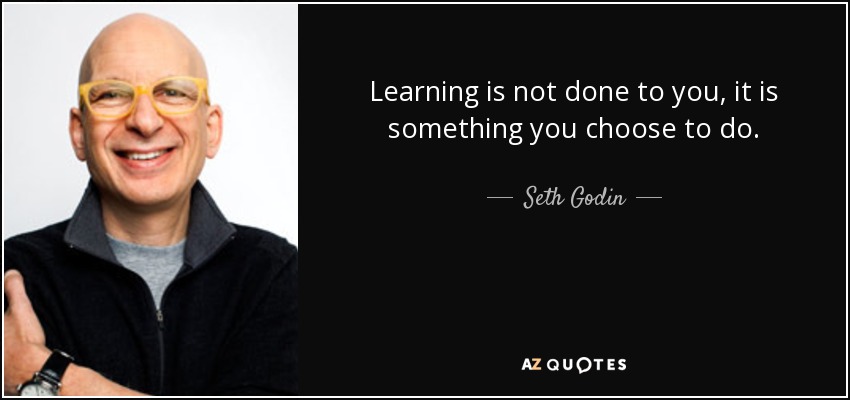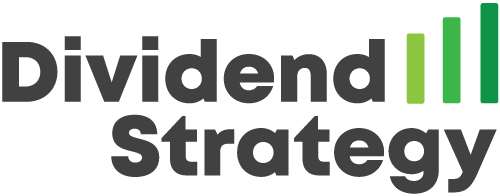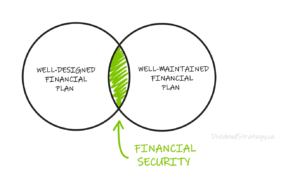So I did. And then I forgot it all. Poof.
Fast forward five years and I’m in medical school. I re-learned it all, and more. Not because I was told I had to, not because there was a test to pass, but because I wanted to. I knew I would need, not just the knowledge, but the understanding, if I was going to be a good doctor. I cared because I was preparing to put that knowledge to action.
And that makes all the difference.
Financial literacy is the same way. We hear the scary statistics all the time: out of control spending, record levels of debt, dangerously low savings rates . . . And the oh-so-obvious solutions: Budget! Don’t drink lattes! Pay off your credit cards! Clearly, there is a lack of financial literacy out there. Why don’t our schools just step up and teach our kids about money? It would be SO EASY to solve the problem of financial illiteracy.
Except it wouldn’t be.
Why? Because there is gap between knowledge and action, and that gap has to be filled before our neurons find something more interesting to do.
KUBA: how we change
A very wise friend of mine, who is a master educator, talks about “KUBA”. KUBA is a mnemonic that describes the fact that knowledge is not enough: there are additional steps we must take to effect behavioral change. KUBA stands for KNOWLEDGE – UNDERSTANDING – BELIEF – ACTION. And it has everything to do with teaching kids about money.
Say you have a teenager who spends money as fast as he makes it. And he’s not happy about it either because what he really wants is a new mountain bike. He knows he should save, his parents encourage it, but he just doesn’t.
He has the knowledge, but he doesn’t understand how to budget his spending or how a savings plan will allow him to accomplish his goal. He’s stuck until he understands.
But even if he did understand the process, that still wouldn’t be enough. He has to buy into the plan, he has to care about the outcomes, and he has to believe it will work.
Once you have accurate knowledge, appropriate understanding, and the motivation of belief, then and only then is effective, sustained action going to happen.

And that’s the problem with school. It offers knowledge, maybe understanding – if you’re lucky – but you can’t get kids to care or change financial habits in a classroom setting. If you want to teach kids about money, the content has to matter to them, not just the grade.
It’s easy to blame financial ignorance on a lack of formal education. I used to point the finger there too. Then I had kids. And I learned how school works (and doesn’t). In my next post I’ll describe how our family tries to instill good financial habits in our four kids. In the meantime, with the greatest respect to the wonderful people who work in education, please don’t teach my kids about money. Here are five big reasons why:
Five reasons schools shouldn’t teach kids about money
1. Financial literacy programs just don’t work.
Maybe I’m putting the punchline first, but the evidence is clear: financial literacy programs just don’t work. The largest meta-analysis on the topic found that financial literacy programs, and they studied 200 of them, only resulted in a 0.1% change in behaviour. Yeah, one tenth of one percent. Thrilling.
A more recent meta-analysis reported a statistically significant increase in financial knowledge (0.25 standard deviations), but this did not carry over to a change in financial behaviours (in which there was only a 0.05 SD change), which is all that really matters.
2. Who would design the curriculum?
Would you trust the school board to design a financial curriculum? Who are they going to go to for content? You guessed it – the financial services industry. The lobbyists would be salivating. “What is the most popular investment product, kids?” . . .”Mutual funds!” Ugh. I want my kids’ knowledge to be evidence-based, not the status quo BS that pervades the industry.
Perhaps this is why formalized financial education programs rarely align with real-world skills.
[Read about the real problem with financial advisors]
3. Kids don’t learn about money until they have money to learn with.
Unless you can see financial concepts in action in ways that affect you, the concepts aren’t going to sink in. Information is not enough when teaching kids about money: they have to understand it, believe it, and act on it. That doesn’t happen sitting at a desk.
Studies show that the effect of financial education decays over time, just like my knowledge of the circulatory system did. You can’t make that information stick with a test. You have to appreciate it’s power and use it in real life.
4. Who is going to teach it?
Teachers are stretched thin as it is. It’s not reasonable to expect them to become proficient at personal finance on top of all their other responsibilities.
Besides, if you add financial education, what are you going to cut? Lunch?
5. False confidence.
Do you teach your kids about history? Geometry? Physics? Me either. School takes care of that. If we ask our schools to teach kids about money, it might be easy for some parents to assume their children have acquired the relevant knowledge and skills, not putting the time and effort into it themselves.
But unlike history, geometry and physics, our kids are going need financial skills in real life all the time. When the average person makes 6-8 financial decisions per day, this is too important to screw up.
Final thoughts
To be clear, I’m not saying that all financial education is useless – I am a financial blogger, after all. I just think that there are much better ways to develop financial skills in young people and the next generation will be far better off if we put our time and energy there. Knowledge converts to action only when its relevance is understood and we believe it has the power to improve our lives.
With this in mind, stay tuned for the next post where I’ll tell you all about how we teach our kids about money. It might spur some ideas and, hopefully, some good discussion in the comments.
If you are beginning your investing journey, please make use of the free content on this site and grow your portfolio. If you have achieved financial independence and have a few dollars to spare, I hope you will consider supporting DividendStrategy.ca. I’m not trying to get rich . . . 20% of donations are given to Doctors Without Borders. Thank you!
BTSX portfolio update October 2021






The basics need to be taught in school. Learning how to use a calculator is one thing. Learning that the data you just inputted does not jive and so the result is false is necessary to use that calculator. Garbage in – garbage out is the saying I believe.
Learning how to control money is learnt at home in great part by how the parents utilize it. Groceries come before that mountain bike. Kids see how the family lives well before they can manipulate their own money. Do they get every Christmas present they want?
And, not to blame teachers, if it not in the curriculum then it is not taught – in most cases
A personal example of that was prior to my daughter going to college we had her math skills checked out by a prof at the school she would attend. Result was that she would need to work hard to step up to the college level. Went to a PTA meeting not long after and questioned the math teacher. Nice man who did his job well. As he explained to me, the required level of education in college was too high for what they taught in HS. I posited that maybe the level in HS should be brought up to a comparable level to meet college entrance requirements. As he said to me, that was not the curriculum set out by the province so he could not teach it. A bit of a lame excuse for “just doing his job”. Sorry situation when the education system does not try to bring out the best rather than churn out the smart enough to get by.
At any rate parenting skills have much to do with how your child or children will conduct themselves in life. My youngest boy only took an interest in doing his math when I said to him I was getting tired of having to fight to get him to do his homework and if he didn’t want my help I would let it go. As I explained to him – there will always be a need for someone with a pick and shovel. He did his homework after that as he didn’t like that option.
So parenting skills are very important in life matters. It will direct them on their choices in their own lives.
RICARDO
Thanks for the excellent comments, Ricardo. In my experience, the school system is a lot like the healthcare system: for the most part, it’s filled with smart, caring people who are hamstrung by red tape and lack of resources. I quoted Seth Godin in the post – he has a lot of insightful content on the subject. The bottom line is that the system is fundamentally flawed; a one-size-fits-all curriculum imposed in a classroom setting where success is measured by test scores . . . it’s just not how we learn.
We have a little experience with homeschooling and when it comes to money, I’m happy that this is, by necessity, a homeschooling subject. Partly that involves teaching concepts and skills but, as you point out, Ricardo, the example we set as adults might be even more important.
Thanks for starting the conversation.
Matt
I agree. I always believe in the saying that “when the student is ready, the teacher would appear”. It goods for kids to have basic knowledge about money and finance but it’s not until they have life experiences and true desire to learn, it will not stick.
Exactly. Thanks for the comment.
One thing I’ve noticed, if you ask parents about their kids and what they do with their allowance (if they get one) is even from a very young age, parents can easily identify which kid always has money in their piggy bank and which kid has empty pockets. Same parents, different kids. Personality matters. Not saying that kids can’t learn to become savers, either from their parents, school or other elsewhere. Perhaps this is the reason financial literacy is so ineffective. As Ricardo above noted, you have to find the thing that motivates them.
Interesting points, LJ. We certainly notice variation among our four kids while at the same time noticing that they are much more likely to save their money than their peers. I don’t think it’s genetic either since neither my wife nor I are “natural savers”. My hypothesis is that the development of money-smarts is largely dependent on quantity and quality of opportunities kids have to experience financial concepts first hand. More on that in the next post.
But back to individual personalities – it’s absolutely a factor in what decision is made, given a particular situation. But, in my experience, one can be a “spender” and still be financially astute; meanwhile “savers” can be financially foolish. This makes me think of our thirteen year old son who’s been running his own lawn-cutting business the last two years. He budgets, invests in his business, has a very impressive bank account balance . . . but he also loves spending on his hobbies (WW2 model airplanes) and on other people. He enjoys expressing affection and gratitude with gifts.
Anyway . . . thanks for the comment, LJ. It’s important to remember how big a role personality plays.
On the one hand I agree with the notion that certain subjects, and I’m certainly cool with including biology among them, are not readily retained for all the reasons you mentioned.
But hopefully none of us will say we retained nothing at all from high school.
I sort of relate the teaching of “finance” to home economics. In Grade 8 my class did half the year in “shop” and the other half in “H-E”. No, I haven’t made plexiglass salad servers since then but I did learn and retain some safety things and it was also my first formal lessons in cooking, something I still enjoy to this day.
So, teaching kids about mortgages and loans and compound interest, the rule of 72, MER, dividends, and so on, isn’t necessarily a bad thing. Certainly no worse than the biology we’ve forgotten over the years (but I’ll never forget dissecting the fetal pig!)
The one concern I strongly share is who builds the curriculum? I agree there is some risk re: your suggestions.
For me, the reasons shouldn’t be “it won’t be retained”. Otherwise, other than Music, I shouldn’t have gone to high school at all.
My last thought is that for many, literacy is probably the most retained skill (for those that achieve it) from our school days (and maybe long division – LOL!!). I think trying to teach some financial literacy has merit.
“So, teaching kids about mortgages and loans and compound interest, the rule of 72, MER, dividends, and so on, isn’t necessarily a bad thing. Certainly no worse than the biology we’ve forgotten over the years” . . . There is certainly a much larger issue here of how effective our model of formal education is, in general, but for the purposes of this blog I thought it best to focus on financial education. I actually agree with you in that “it won’t be retained” is not a good reason not to teach about finance. It’s possible to imagine a situation where specific information might not be retained while behaviour is still positively impacted. Alas, with finance, there seems to be no impact on behaviour. That’s the big issue. Some might say, “But it can’t hurt” – I’m not so sure about that.
Why is linguistic literacy retained and even improved upon beyond our years in school? Because it’s useful and it is used on a regular basis. (Sidebar: for me, long division ticked neither of those boxes and was forgotten until I had to help my kids with it a few years ago!)
Thanks for contributing to the conversation, James. Friendly challenges make for better discussion. All the best. ~Matt
I’m always happy to be the contrarian….LOL – just ask my wife.
“It’s possible to imagine a situation where specific information might not be retained while behaviour is still positively impacted.”
I think it’s possible to teach some basic fundamentals that may not change behaviour – after all we’re talking about high school kids who may or may not have even a part time job, yet it may help prepare them for the future in some small way.
I strongly believe that teaching high school aged students about (for example) mortgages, compound interest, and other personal finance topics, using real world situations that will be familiar to them from the news or via their parents, stands a much better chance of being useful than say Force = Mass x Acceleration. Maybe I’m naive, and maybe I’m partially blinded by my passion for being a sponge about this stuff today.
Although my wife teaches younger students, we have a circle of friends of teachers of all grades, and when I hear about what little support students get from their parents (across the all grades), even for some of the most basic things, I actually think it’s a bigger problem to leave financial education to parents. I understand that most of us reading this blog are more than capable of taking it on (and I commend Werner for his actions in particular) but I don’t think those of us who come here are very representative of society at large.
I did a very informal survey with my early twenties daughter and asked what she thought about learning mortgages and other personal finance topics in high school. Her immediate answer was “well, that would’ve been better than learning Pythagorean theorem”. Something to think about…..
My impression of high school is that although much of what is taught to you, and hopefully absorbed, is an exercise in logical thinking and working out problems. The vast majority of us do not use the algebra, geometry, physics biology or many of the other courses. Never the less, it made us use our minds for other things than every day life matters. So if a new concept crosses our lives than hopefully we can learn from it.
The one course I really found useless was religion (Catholic school).
Everything else I believe I learned something – even if i can’t remember what the hell it was!
RICARDO
I enjoyed reading your blog on teaching financial literacy to children. I fully concur that we cannot delegate the teaching of personal finance to school teachers. As parents we have to inform our children about the danger of excessive debt and unrealistic frugality. It is essential that we lead by example, since children are likely to use our behavior to excuse some of their possible shortcomings later in life.
Many years ago we decided to financially support our grandchildren during their university years. Our bi-annual contribution could be used to pay tuitions, cover living expenses or to invest in stocks. To purchase cars or vacations were not options available to them.
At the start of their first year each decided to open a TFSA at a discount brokerage. With each contribution I would recommend several companies for their consideration. We would discuss their merits and risks. The final selection and responsibility was always theirs. The plan was that after four years each would have an basic understanding of the working of the stock market and also to be the proud owner of eight investment in well managed companies.
This was not an inexpensive undertaking. There were also some frustrations along the way with cash hording and lack of timely decision making. In the end it was all worthwhile. It allowed us to teach our young people the value of saving and good money management.
All six continue to invest in the market. Two sold some stocks and used the proceeds as down payment for condos. We still occasionally discuss investing and stock selection but each of them feels able to manage their investments.
I feel very fortunate and grateful for having had the cooperation of my grandchildren in this endeavor.
I absolutely love this story, Werner. Having investments and the experience of watching them grow is an incredibly powerful motivator to be more engaged and financially responsible. But a lot of people have a really hard time getting started. It’s especially powerful if people can get started actively (i.e. not just handing the reins over to an advisor) and with a mentor to coach them through the initial rough spots. Your grandchildren are very fortunate, and we’re very fortunate that you shared this with us. Thank you. ~Matt
Pingback: Weekend Reading – Dividends Matter - My Own Advisor
Pingback: It's up to us to teach our kids about money: the 5 pillars of money mastery
Your statement own this “A more recent meta-analysis reported a statistically significant increase in financial knowledge (0.25 standard deviations), but this did not carry over to a change in financial behaviours, which is all that really matters.” is inaccurate. The authors of the meta-study said it was small but still significant effect.
You’re right – I could have been more clear. I was referring to the magnitude of the change in outcomes, not the statistical significance. In this study, there was a 0.05 SD change in financial behaviours that was statistically significant. Even that small change is suspect, however, mainly due to time frames: i.e. measuring behavioural change a year after the course vs 5 years yields very different results.
Still, I appreciate your eye for detail, Dividend Power, and I have edited the post. Thanks for keeping me honest 🙂